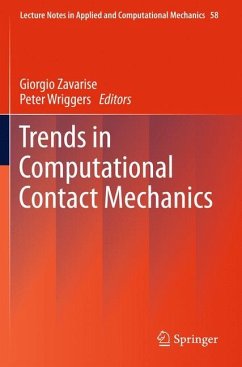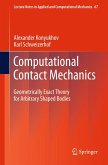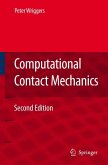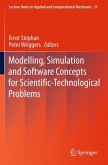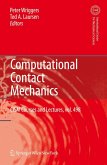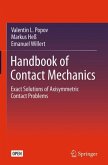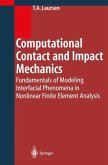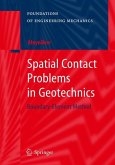This many-faceted topic is a key factor in developing theories into real-world industrial applications. This volume, the edited outcome of the first International Conference on Computational Contact Mechanics, ICCM 09, covers the state of the art in the field.
The subject of Computational Contact Mechanics has many facets. Its main impact lies in the transfer of knowledge form theoretical research to applied sciences, and from there to industry. The application fields are literally countless, ranging from classical engineering to biomechanics and nano-sciences.
The remarkable increase of computer power in recent years has been instrumental in enabling the development of simulation-based analysis in current design activity. This still involves tremendous effort in research, which focuses on, for example, multi-field and multi-scale problems, algorithmic robustness, and geometrical accuracy. Moreover, several aspects of Contact Mechanics, Debonding and Fracture Mechanics, have been combined to offer new enhanced possibilities to the computer simulation of complex phenomena.
With these contributions of prominent scientists, this book offers a wide overview on the ongoing research at the highest level in the field.
Hinweis: Dieser Artikel kann nur an eine deutsche Lieferadresse ausgeliefert werden.
The subject of Computational Contact Mechanics has many facets. Its main impact lies in the transfer of knowledge form theoretical research to applied sciences, and from there to industry. The application fields are literally countless, ranging from classical engineering to biomechanics and nano-sciences.
The remarkable increase of computer power in recent years has been instrumental in enabling the development of simulation-based analysis in current design activity. This still involves tremendous effort in research, which focuses on, for example, multi-field and multi-scale problems, algorithmic robustness, and geometrical accuracy. Moreover, several aspects of Contact Mechanics, Debonding and Fracture Mechanics, have been combined to offer new enhanced possibilities to the computer simulation of complex phenomena.
With these contributions of prominent scientists, this book offers a wide overview on the ongoing research at the highest level in the field.
Hinweis: Dieser Artikel kann nur an eine deutsche Lieferadresse ausgeliefert werden.

